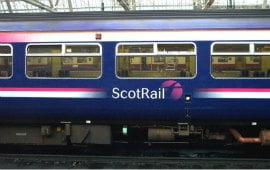Workers at ScotRail are due to take strike action over the Christmas period. We publish here a report from a worker at ScotRail, who explains the background and reasons behind the strike.
After having worked for ScotRail for only five months I came to know it as a company where agency employees, many having been in their job for over a year, were on a regular basis simply told at the end of their shift not to return the next morning. As with the case of Scott Lewis, whose dismissal has led to the RMT calling strikes for their ScotRail members on the 22nd and 24th of December, the reasoning behind the firing of these employees was never wholly disclosed.
As on-train hospitality assistants my colleagues and I were subjected to highly unrealistic targets and agency employees, who had far less employment rights, were subjected to a regular reshuffle so as to create an atmosphere of fear and pressure in order to encourage hospitality assistants to chase out-of-reach targets. This can be seen as part of a trend across service sector jobs where pressure is mounted upon workers to both create as much profit as possible and also offer a “friendly” service with the threat of dismissal/other disciplinary action hanging over their heads.
As we have entered further into a service sector based economy –the distributions, hotels and restaurants sector is now the second largest in Britain – the proliferation of companies offering the same service (you can now travel from Edinburgh to Aberdeen on three separate train operatives) has led to an increasing focus on service as a selling point for customers. Of course, this has put greater strain on staff who already work amidst the stress of shift work (seven days of work in a row was regularly a requirement of the roster) combined with pressure to take on overtime as a result of understaffing due to the regular dismissals previously referred to. The necessity for hospitality assistants to increase profit, and ticket inspectors to ensure passengers possess a valid ticket, has at least some contradictory elements with the highly customer focussed service demanded by the government, particularly given the context of a few staff working with many customers in an environment with the potential to become high stress.
This potential for a high stress environment can clearly be seen in the verbal and physical abuse carried out upon staff working across the railway. In my own former position female staff are frequently subject to sexual harassment and hospitality assistants of each gender become accustomed to verbal abuse, particularly of the homophobic and debasing variety. The advice on what to do in these situations was typically unclear with it mainly resting solely on the member of staff informing the conductor on the train. Therefore, the welfare of the staff member depended on both the conductor’s response to the situation and his/her actually being visible (a particular problem when conductors are permitted to ride in cabs on the train that other members of staff do not have access to). Much more emphasis was put on reporting incidents such as a trolley running over a passenger’s foot in case of the passenger later making a formal complaint. Recent cases of violence against ScotRail staff include the racial abuse of a gate line member of staff at Glasgow Central train station and there will of course be many cases that go unreported in the media; including the four occasions where Scott Lewis, the dismissed ticket inspector whose case the strike is based on, was assaulted by a passenger.
Over the summer the threat of violence to staff has also been added to with ScotRail implementing a ban on the consumption/carrying of alcohol between 9pm and 10am. It’s been the only rail operative to have done so, which means that different rules will apply to different trains on the same route at approximately the same time leading to much confusion for passengers. It could be argued that the ban will help prevent staff from suffering assault but in reality it has increased the possibility for situations which could lead to violence; the actual rules of the ban are not particularly clear on whether or not alcohol will be allowed to be carried on a train if it is in a bag and its supposed enforcement by the British Transport Police (BTP) is questionable; obviously it will take the BTP time to reach trains and as they may not always be available as quickly as necessary, this leaves much of the enforcement to fall onto on-train staff, primarily conductors/ticket inspectors. This leads to the potential for an altercation between staff/passenger, particularly if the passenger has been allowed to consume alcohol up until a certain point in time and is then asked to stop and where on-train hospitality assistants have to stop selling alcohol after 8.30pm but it remains visible to the customer. Problems could also arise in relation to the previously mentioned differing rules applied by other train operatives on the same route.
It is in this context, where railway staff are being asked to oversee the carrying out of highly specific rules in relation to both alcohol and the ever complicated ticketing system but also to remain highly customer focussed, that cases like that of Scott Lewis potentially can arise. After nineteen years of service, receiving a number of awards and undergoing the previously mentioned assaults, Mr. Lewis was dismissed from his position following a complaint from a passenger when he, as a ticket inspector, asked to view their invalid ticket. It was claimed that he made ‘”unwanted contact with the passenger”’ but ScotRail have been unwilling to release full CCTV images of the event to the RMT union or Scott Lewis himself. It would thus seem that the allegations and his dismissal arebased on somewhat shaky grounds, particularly as he is said to have simply been following company procedure in relation to his ticket examination.
This incident cannot be seen as a one off. It is clearly located in the context of a company making contradictory demands of its staff and wishing only to show loyalty to the customers who bring in their profit. It can be seen as part of a process of commercialisation, worsening conditions and increasing fares that has occurred across the British rail network post denationalisation.
This is why we support the striking ScotRail staff who ScotRail representatives claim are launching a “clear attack on the travelling public” and that their strike “reeks of selfishness”. The strike must not be seen as anything but an attack on an employer that disregards the rights of employees not to have their safety impeded through difficult to enforce rules as well as contradictory messages on behaviour having to both ensure that rules are enforced and profit is made whilst also always putting the customer first. ScotRail, like all other companies, is only concerned with its profits – not its staff or its passengers. Passengers are only put ahead of workers due to their creating of company profit. We must not allow the strike to be demonised as ruining the festive period but instead see it as workers taking the opportunity to cause dents in the profit of the bosses, the only way they can gain leverage in the case, bosses who have shown complete disregard for their rights, safety and the stresses/strain caused through shift work in a potentially high stress environment.






